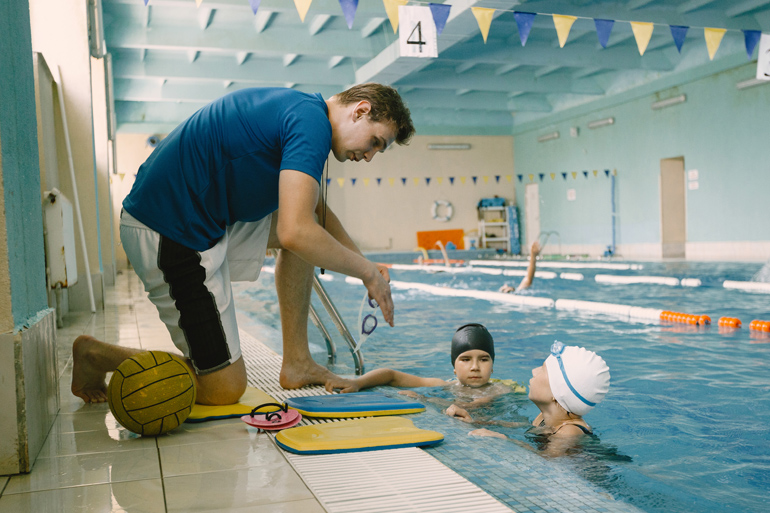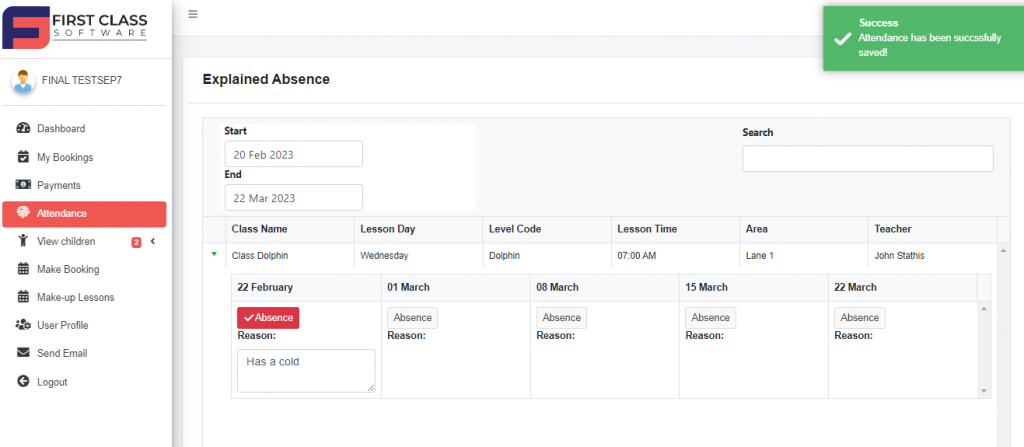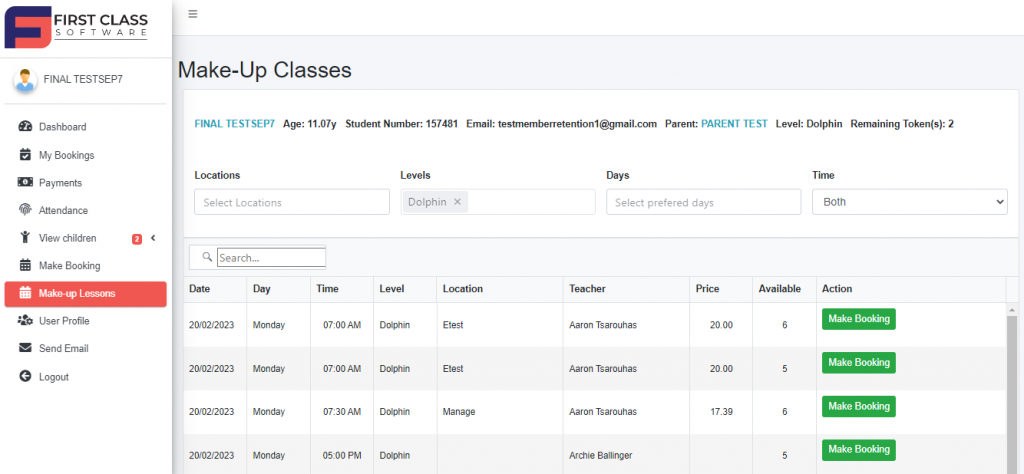
One of the most dividing topics for children’s sporting lessons businesses is make-up lessons.
Do they help?
Are they worth the effort?
In this article, we go deep into exploring makeup lessons, the pros and cons and outline our thoughts on best practices.
What are makeup lessons?
Make-up lessons are compensation for a child/student missing a paid lesson typically from illness.
Sports businesses such as swim schools use make-up lessons are an alternative to providing credits or refunds to customers when their child misses a lesson.
Throughout the industry, opinions on makeup lessons are extremely varied. Some people love them and provide unlimited make-up lessons to their clients whilst others do not offer them at all.
How do make up lessons work?
As indicated earlier, make-up lessons are provided to a student who misses a class (typically because of illness).
If a student is reported as absent, this entitles the student to a make-up lesson pass or token which can be used to redeem a makeup lesson to compensate for the class they missed.
What are the pros?
Less work to provide customers with credits or refunds for missed lessons.
If your sporting business does not provide make-up lessons, often parents will seek some form of credit or refund for missed lessons. If it is your policy to provide a credit for a missed lesson this can result in additional work to process credits to customers.
Happier customers
Customers are more likely to feel like they are getting value for money with your service if they are able to have the peace of mind of knowing that they can book a make-up lesson if their child is ill or injured.
Better progression
Children progress better with continuity. If they are consistently missing lessons, they are likely to progress slower. A lack of progress can increase dropout risk so this can have a negative impact on customer retention.
Better retention
If a parent has a child who is prone to colds (particularly during the colder months) if they miss a few lessons due to health reasons and is not able to get compensation in the form of make-up lessons, they may feel it’s not worth continuing and drop out of your program.
Less chance of spreading illness from sick children attending
With make-up lessons, parents are more likely to keep sick children at home which is likely to spread illness to other children and staff. In the current climate, it’s hard enough to find enough staff so it’s important to minimize the chances of your workforce getting sick whilst at work.
What are the cons?
Time-consuming
Make-up lessons can be time-consuming to administer, particularly if you are booking them directly via phone or at a reception desk. In fact, we have spoken to swim schools who book hundreds of make-up lessons each week, and managing this alone became a part-time job.
Parents can abuse/manipulate.
Parents can sometimes abuse or take advantage of your make-up lesson policy. Sometimes they can try and claim lessons for being away on holidays or other invalid reasons. We have heard stories of some parents asking to have their make-up lessons converted into cash at the end of a term. Some even try and claim more make-up lessons than they are entitled to.
It can take up the spots of paying customers.
If you have a high occupancy rate then sometimes make-up lessons can take up the potential spots for paying permanent students. You do not want to turn away business if you can reasonably find them a spot.
Using technology to manage make up lessons
In the current day and age, technology can help make the management of make-up lessons a whole lot easier. By using class management software with strong make-up lesson functionality, you can eliminate a number of the downsides of offering make-up lessons.
A good class management system should include.
- The option for parents to book make-up lessons online via an online portal or app.
- It should allow parents to only book the correct classes (their child’s current lesson only)
- The automated management of make-up lesson “tokens” that can be assigned when a parent records an explained absence.
- The ability to set up rules and restrictions.
- The ability to set terms and conditions that the parent must agree to outline your make-up lesson policy.

Example: Swim school software First Class shows parent recording an explained absence.
Most importantly, an online class management system should be easy for the parents to use and book make up lessons for their children.
Rules and Recommendations
Although the opinions on best practices for providing make-up lessons vary greatly, below we have outlined our thoughts on best practices for providing make-up lessons.
1. Manage online.
One of the biggest cons of providing make-up lessons is the admin time it requires to manage bookings. By using software in the form of a customer or parent portal, you can allow customers to book their make-up lessons online. If you are currently managing to make-up lesson bookings manually, moving online can cut hours of your weekly admin requirements.
2. Set a limit
As we mentioned earlier, another downside of providing make-up lessons is that it can take up available spaces which can potentially be booked by a new permanent student.
Some operators have a policy of providing unlimited make-up lessons. In our opinion, this option has a number of downsides such as parents skipping lessons for minor reasons rather than true illness or injury.
By setting a limit on the number of tokens a parent can “unlock” in a given period (say 2 lessons per term or 90 days), the parent is more likely to use them more sparingly and it prevents too many of your available spaces being taken up.
Good software will allow you to set a token limit for your online make-up lessons.

A swim school using First Class Software to manage make-up lessons
3. Set an expiry
In addition to setting a limit, an expiry of make-up lesson tokens is also important.
If a customer unlocks a make-up lesson token, can they leave your program, and return months later and re-deem that original make-up lesson?
We recommend setting an expiry for your make-up lesson tokens. A period of 30 days is reasonable and ensures your customers take up their lessons in a reasonable time frame. The whole idea of a make-up lesson is to compensate for a missed lesson and to keep a child progressing, therefore it makes sense to encourage make-up lessons to be taken as quickly as possible.
Again, a good software program can automate this process for you. Check out firstclassretention.com for more information.
4. Allow bookings to be taken in place of explained absences
In order for parents to unlock a makeup lesson token, it’s important that they first record an absence on their parent portal. This process is what allows the software to manage to make up lessons online in a self-serve manner. Good class management software will also allow parents to record a reason for the absence as well as require an absence to be reported a certain period before the lesson starts. For example, you may require parents to give 1 hour’s notice for their absence to unlock a makeup lesson token.
5. Set clear terms and conditions.
Finally, it’s important to set clear terms and conditions for parents about your make-up lesson policy.
As mentioned previously, parents can sometimes have the wrong expectations and this can lead to frustration and potential conflict.
Make sure your make-up lesson policy is very details and clear and that each parent agrees to the policy before lessons commence.
If you’re interested in taking your make-up lessons online and reducing your admin time – check out our software, First Class – www.firstclassretention.com
